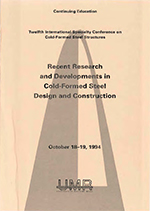Location
Saint Louis, Missouri
Session Dates
18 Oct 1994
Abstract
The paper describes a test program on welded stainless steel X- and K-joints fabricated from circular hollow section brace members and chords. The X-joints were tested in compression and tension using three different ratios of brace diameter to chord diameter. The K-joints were tested using three different ratios of brace diameter to chord diameter and three different angles between chord and brace members. A total of 15 tests were performed. Design rules are proposed for X- and K-joints by adopting the rules of the CIDECT Recommendations for carbon steel tubular structures and replacing the yield stress in these recommendations by a proof stress. It is shown that both the 0.2 % and 0.5 % proof stresses, as determined from the finished tube, can be used to determine the ultimate strength using the CIDECT strength rules. For K-joints, the serviceability limit state corresponding to joint deformations of 1 % of the chord diameter will not be exceeded if the CIDECT strength rules are adopted. However, for less than full width X-joints, the deformations are likely to reach about 1. 7 % and 1.9 % of the chord diameter if the design strength is based on the 0.2 % and 0.5 % proof stresses respectively.
Department(s)
Civil, Architectural and Environmental Engineering
Research Center/Lab(s)
Wei-Wen Yu Center for Cold-Formed Steel Structures
Meeting Name
12th International Specialty Conference on Cold-Formed Steel Structures
Publisher
University of Missouri--Rolla
Document Version
Final Version
Rights
© 1994 University of Missouri--Rolla, All rights reserved.
Document Type
Article - Conference proceedings
File Type
text
Language
English
Recommended Citation
Hasham, Anthony S. and Rasmussen, Kim J. R., "Stainless Steel Tubular Joints - Tests and Design of X- and K-joints in Circular Hollow Sections" (1994). CCFSS Proceedings of International Specialty Conference on Cold-Formed Steel Structures (1971 - 2018). 1.
https://scholarsmine.mst.edu/isccss/12iccfss/12iccfss-session9/1
Stainless Steel Tubular Joints - Tests and Design of X- and K-joints in Circular Hollow Sections
Saint Louis, Missouri
The paper describes a test program on welded stainless steel X- and K-joints fabricated from circular hollow section brace members and chords. The X-joints were tested in compression and tension using three different ratios of brace diameter to chord diameter. The K-joints were tested using three different ratios of brace diameter to chord diameter and three different angles between chord and brace members. A total of 15 tests were performed. Design rules are proposed for X- and K-joints by adopting the rules of the CIDECT Recommendations for carbon steel tubular structures and replacing the yield stress in these recommendations by a proof stress. It is shown that both the 0.2 % and 0.5 % proof stresses, as determined from the finished tube, can be used to determine the ultimate strength using the CIDECT strength rules. For K-joints, the serviceability limit state corresponding to joint deformations of 1 % of the chord diameter will not be exceeded if the CIDECT strength rules are adopted. However, for less than full width X-joints, the deformations are likely to reach about 1. 7 % and 1.9 % of the chord diameter if the design strength is based on the 0.2 % and 0.5 % proof stresses respectively.



